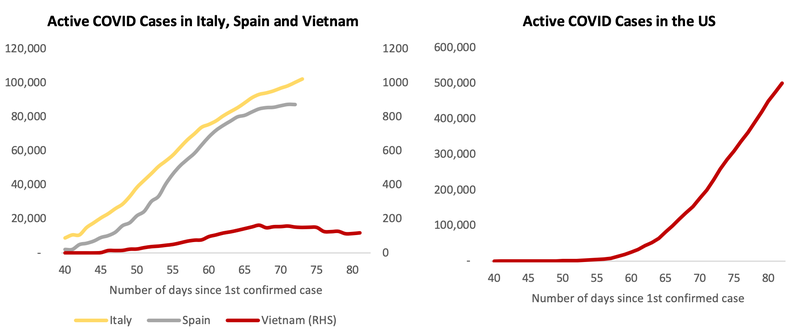Effective public health measures help Vietnam economy grow the fastest in region
Vietnam’s economy is likely to loss a 3.5 percentage points in GDP growth due to the Covid-19 pandemic versus the 6-7 percentage points reductions of other countries in the world.
The effective public health measures and the fact that the Vietnamese government did not completely shut down the economy would help the country to maintain the highest economic growth in the region, according to Vietnam’s leading asset management firm VinaCapital.
Flattened Covid-19 curve
Vietnam’s first case of Covid-19 appeared on January 23, and since then the pandemic curve of active number of cases has been much flatter than the “Covid curves” of other countries that took longer to respond to the pandemic, and/or did not follow all of the public health best-practices that were done in Vietnam.
| Source: VinaCapital. |
Those actions include a widespread public health campaign on traditional and social media, a highly effective contact tracing and quarantining program, and a reasonable amount of testing for the virus (as of April 5, Vietnam had tested 0.1% of its population versus 0.2% in the UK).
In addition, Vietnam instituted a system of tracking not only people who were infected (who are designated as “F0” patients), but those who had direct or indirect contact with infected persons and/or suspected cases.
Vietnam’s economy less affected than others
Meanwhile, many of Vietnam’s factories and farms are still operating, and more retail stores are still open compared to other countries. As a result, a far higher percentage of the population is able to continue working and earning wages compared to other countries, although many are now working from home.
According to a research paper published by Harvard University economist Robert Barro last month, many countries are likely to suffer a plunge of six percentage points (ppts) or greater in their GDP growth rates this year, based on the economic impact of severe pandemics in the past, like the Spanish flu.
For example, the US economy was set to grow by 2% in 2020, but the Covid-19 pandemic is likely to reduce its GDP growth by seven ppts this year, so most economists now expect the US economy to shrink by 5% this year.
Closer to Vietnam, Thailand’s economy was set to grow by 3% in 2020 before the pandemic came to light, but now the country’s GDP growth is likely to fall by eight ppts this year, resulting in an economic contraction of 5% in 2020.
In stark contrast, most economists expect Vietnam’s economy to continue growing by 3.5-4% in 2020, and possibly by even more, depending on the effectiveness of the Government’s measures to support growth.
Meanwhile, the number of expected job losses in Vietnam announced by local industry associations and others point to an increase in the country’s unemployment rate from about 2% at the beginning of 2020 to nearly 5% by the end of this month.
Such an increase will present a big challenge for the nation’s policy makers, but the unemployment rate in the US is set to reach 20% by the end of April, illustrating how much worse Vietnam’s situation could have been had it not been for the effective public health measures the government took right from the onset of the pandemic around Tet, stated the asset management firm.
Another key point is that Vietnam manufactures high-end products such as smartphones and digital cameras, but the majority of made-in-Vietnam consumer products are still low-end goods that are exported to the US and EU, and later sold to cost-conscious shoppers in discount stores like Walmart in the US, and Carrefour in Europe.
The demand for low-end consumer products (such as sports equipment/yoga mats, pet toys, gardening items, low-end kitchen appliances, etc.) usually remains resilient during economic slowdowns. Consumers who were previously accustomed to buying expensive luxury products before the recession then shifted to shopping more economical products sold in discount stores to reduce their expenses in the recession time.
Since Vietnam’s public health officials have been able to “flatten the Covid curve”, with the total number of cases remaining fairly flat over the last four days, it is expected “the re-opening of Vietnam to proceed fairly smoothly once the decision has been made to do so,” said VinaCapital.












